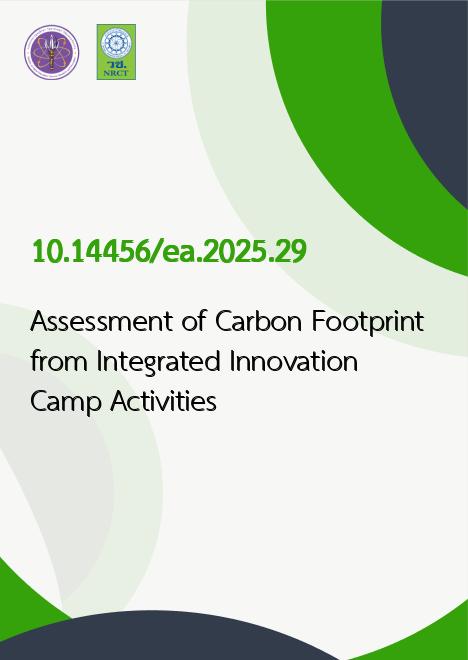
|
Assessment of Carbon Footprint from Integrated Innovation Camp Activities |
|---|---|
| รหัสดีโอไอ | |
| Creator | Chalor Jarusutthirak |
| Title | Assessment of Carbon Footprint from Integrated Innovation Camp Activities |
| Contributor | Prakaytham Suksatit, Benjapon Thongudom, Chanakarn Khunthong, Manuschanok Janbenjanath, Siraphob Obpat |
| Publisher | Thai Society of Higher Education Institutes on Environment |
| Publication Year | 2568 |
| Journal Title | EnvironmentAsia |
| Journal Vol. | 18 |
| Journal No. | Special |
| Page no. | 133-142 |
| Keyword | Carbon footprint, Greenhouse gas emission, Innovation camp |
| URL Website | http://www.tshe.org/ea/index.html |
| Website title | EnvironmentAsia |
| ISSN | 1906-1714 |
| Abstract | This study evaluated the carbon footprint generated by activities conducted during theKU Innovation Camp, which integrated multiple scientific disciplines. The camp served as aplatform for students to develop innovative solutions while participating in various activitiesthat contribute to carbon emissions. The objective of this study is to evaluate carbon footprintfrom key activities, including transportation, energy consumption, food and beverages,accommodation, and waste management. The assessment revealed a total carbon footprintof 12.35 tCO2e, originating from the following sources: food and beverages (4.71 tCO2e,38.12%), electricity (3.05 tCO2e, 24.70%), accommodation (2.23 tCO2e, 18.03%), transportation(2.07 tCO2e, 16.72%), waste (0.30 tCO2e, 2.42%), and souvenirs (0.0002 tCO2e, 0.002%).Scenario were simulated to propose strategies for reducing carbon emissions. These strategiesinclude optimization of food and beverage by adjusting meal type and implementing energyconservation practices. These measures can reduce the carbon footprint from 12.35 tCO2e to10.82 tCO2e, a reduction of 1.53 tCO2e (12.39%). |